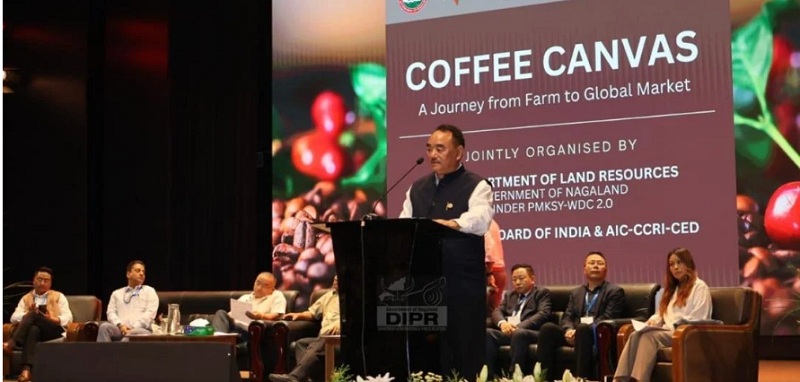Kohima: Highlighting Nagaland’s rising prominence in the global coffee market, the Department of Land Resources, in collaboration with the Coffee Board of India and AIC-CCRI-CED, has hosted the ‘Coffee Canvas’ event at the Capital Cultural Hall in Kohima.
The event ‘Coffee Canvas: A Journey from Farm to Global Market’ highlights the growing prominence of Nagaland’s coffee sector in both domestic and international markets.
Speaking at the event, MLA and Advisor for Land Resources, G. Ikuto Zhimomi, underscored the global demand for coffee.
He stated is coffee is the second most consumed beverage worldwide after water, with over 2.25 billion cups consumed daily.
He stated that Nagaland, alongside Assam, Manipur, and Meghalaya, is contributing significantly to the coffee sector in India’s Northeast.
Zhimomi highlighted Nagaland’s vast, untapped coffee potential, noting that 10.4 lakh hectares—62.7% of the state’s total area—are suitable for cultivation. However, only 11,187 hectares have been utilized so far.
He also highlighted Nagaland coffee’s international recognition, including a silver award in 2021 and gold in 2023 at the Aurora International Taste Challenge in South Africa.
He announced that coffee is now Nagaland’s official Unique Selling Point (USP), poised to drive economic growth. This includes boosting the economy through plantations, processing, eco-tourism, and a thriving café culture, thereby creating employment opportunities across the entire value chain.
Albert Ngullie, Director of Land Resources and CEO, SLNA, stated that Nagaland is promoting coffee cultivation based on principles of ecology, employment, and economy. He highlighted the state’s favorable conditions for Arabica and Robusta varieties and reiterated the department’s goal to expand cultivation to 50,000 hectares by 2047.
Ngullie reported that only 863 hectares (8%) of the cultivated coffee area are currently under harvest, yielding 195.40 metric tonnes of parchment and cherry coffee. He anticipates a significant increase, with at least 50% of plantations expected to reach the harvesting stage within the next two years. To further support the sector and foster entrepreneurship, he noted the establishment of 16 coffee cafés, 12 washing stations, and 7 roasteries, alongside various training programs and exposure trips.















